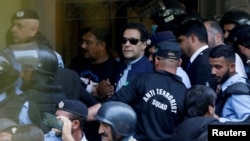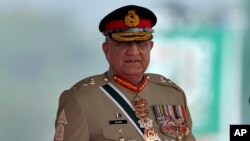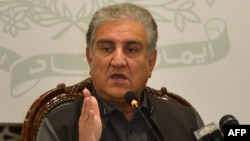Pakistan's jailed former prime minister, Imran Khan, pledged Monday to summon the country's ex-military chief and a U.S. embassy representative during his ongoing trial for allegedly leaking state secrets.
Khan made the statement during a hearing in the case inside a prison complex near Islamabad, where the federal government, citing "serious security risks," has set up a special single-judge court to try the popular, 71-year-old politician under the Official Secrets Act.
Prison authorities allowed six local media reporters to attend Monday's proceedings while blocking foreign media, in breach of a recent federal court order for public and media access.
"I will include General Bajwa and U.S. embassy officials as witnesses [in the case]. Bajwa did everything on Donald Lu's directives," Khan was quoted as telling the judge.
He referred to the country's former army chief, Qamar Javed Bajwa, and Lu, the U.S. assistant secretary of state for the Bureau of South and Central Asian Affairs.
Khan's attorneys later confirmed his remarks and explained that a request would be formally submitted to the court to summon Bajwa and a U.S. embassy representative as the trial proceeds.
Intazar Hussain Panjutha, a member of Khan's legal team, said that "only a select group of journalists" was allowed to cover the proceedings "in the name of the open court hearing." He denounced authorities for not permitting international media, including VOA and the BBC, to attend the hearing.
"It is not an open trial by any legal definition. We do not believe we will receive a fair trial under the current circumstances," Panjutha told VOA.
Khan is expected to be indicted on December 12 when the court reconvenes. The charges against him stem from a March 2022 classified Pakistani diplomatic cable, known as a cipher, that allegedly documented the United States' role in toppling his government through a parliamentary no-confidence motion a month later with the help of Bajwa, the then-army chief.
The former prime minister is accused of leaking the cipher contents to the public to block the parliamentary motion and score political points. The cricket star-turned-politician rejects the charges, saying they are a ploy by the military to block him from returning to power.
A U.S. news outlet, The Intercept, published the purported text of the cipher for the first time in August.
The text was written by Islamabad's then-ambassador to Washington, Asad Majeed Khan. The document purportedly quoted Lu as asking the diplomat to tell the Pakistani military leadership they should oust Imran Khan through the parliamentary motion because of his government's neutrality over the war in Ukraine.
Lu allegedly threatened that the United States would isolate Pakistan internationally if Khan remained in power.
The deposed prime minister was in Moscow for an official meeting with Russian President Vladimir Putin on the day Putin launched the war. Khan defended the state visit, saying it was the outcome of weeks of planning and the eruption of the conflict was a mere coincidence.
The State Department, while commenting on the reported cipher content, said that Washington had objected to Khan's visit to Russia, but it had nothing to do with his removal from office.
The Pakistani military, which has ruled directly or overseen elected governments since the country's independence from Britain in 1947, denies any involvement in Khan's ouster.
In October, Khan and his former foreign minister, Shah Mahmood Qureshi, were indicted in the cipher case in controversial closed-door judicial proceedings at the prison. The legal process for the closed-door proceedings was quashed by a higher court last month, ordering authorities to conduct a fair and open trial in line with constitutional requirements.
In early August, Khan was convicted and sentenced to three years' incarceration for unlawfully selling state gifts he received in office from 2018 to 2022. He denied wrongdoing. A federal court later suspended the sentence and granted him bail, but authorities refused to let him walk out of the jail, citing the cipher case.
The nuclear-armed nation of about 241 million people is scheduled to hold national elections February 8 amid expectations the vote will help end the lingering political turmoil in Pakistan that erupted after Khan's ouster.
Unless overturned by a court, his conviction in the graft case will continue to block his participation in the elections. Critics doubt an election without Khan will deliver the political stability the South Asian nation desperately needs to deal with its dire economic challenges.
Khan has "dismissed the possibility of cutting a deal (with the military) to find an easy way out" of the prison, his party quoted him as telling reporters after Monday's court proceedings.
"He was confident he'd be successful in the end and asked his support base to call for change by using ballot papers in massive numbers (in the elections)," the party statement said.






